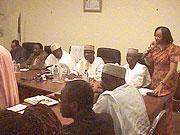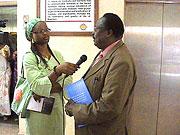Nigeria to expand operational blood transfusion centres to 17 - World Blood Donor Day 2008
Nigeria joined the rest of the world on June 14th 2008 to mark the world blood donor day with theme aptly coined “Giving Blood Regularly”. Activities for this year’s world blood donor day started on the 13th of June with a ministerial press briefing, national live radio discussion programme (Saturday Morning Live) and blood donation drive at the residence of the Saudi Arabia ambassador in Abuja on Saturday 14, June 2008.
In his speech on the occasion of the Year 2008 World Blood Donor Day Celebration, the Honourable Minister of Health, Dr. Hassan Muhammad Lawal, CON, highlighted the uniqueness of this year’s event in that it marks the 200th year anniversary of the 1st successful transfusion of human blood to a patient for the treatment of postpartum haemorrhage.
blooddonor1
The minister reminded the gathering of the Federal Government’s efforts in ensuring safe blood for its citizenry. According to him, the establishment of the National Blood Transfusion Service is to provide a system of supplying safe and adequate quality blood and blood products to patients who may need it in any part of the country. The national blood policy is built on voluntary non-remunerative donation of blood by healthy individuals. Over the past four years, immense progress has been made at building a strong and sustainable National Blood Transfusion Service for the people of Nigeria. From the first Centre opened in Abuja in December, 2004, we now have 11 operational Centres across the six geopolitical zones in the country. These Centres are in Abuja, Kaduna, Owerri, Ibadan, Lokoja, Jos, Maiduguri, Port-Harcourt, Benin City, Nangere – Potiskum, and Abeokuta. The minster informed the gathering that the government is working at opening six additional Centres in Sokoto, Katsina, Jalingo, Ekiti, Enugu and Calabar to make a total of 17 operational Blood Centres by the end of this year.
In attendance at this year’s World Blood Donor Day ministerial press briefing were stakeholders’ in blood safety in Nigeria including high level policy makers, the UN agencies, USAID and its implementing partners and local NGOs. In his remarks, the WHO Representative in Nigeria, Dr Peter Eriki, commended governments effort and advised that attention be focused on attracting a pool of repeat, non-remunerated, voluntary donors. His said this in support of national blood campaigns which seek to build adequate cadre of volunteer donors who make a long term commitment to blood donation. He said we not only need to expand this pool rapidly but also to have a greater responsibility in ensuring that those we enlist on board stay on for life. This will drive them to maintain healthy life-styles and in so manner contribute positively to their own health and well-being. He concluded by informing the gathering of the great strides China and the United Arab Emirates (UAE) have made in tackling the risk of contamination from unsafe blood by reaching close to 100% voluntary blood donation. He said their efforts to increase their safe blood base will be promoted as models for other countries to follow.
Compared to 1998, when systems of paid donations or donations from family members made up 80% of its blood supplies, China has achieved 98.5% voluntary donations in just 10 years. The UAE went from 0% of voluntary donations in 1990 to 80% in 2004 and 97.6% in 2006.
blooddonor2
He said studies reveal that some governments perceive the task of mobilizing the population to donate blood without payment or family interest as insurmountable. But China and the UAE have shown that it is possible to change donor behaviour in a very short time. He called on the government to emulate these rapid strides by creating an enabling political environment, fostering a culture of voluntary blood donation, using media and other channels to raise awareness, building a stable blood donor pool and providing quality care for donor health and safety.
He concluded by reiterating WHO’s continued support to Nigeria in ensure 100 per cent voluntary unpaid blood donation. With support of all, WHO will make impact for World Blood Donor Day 2008, and bring Nigeria one step closer to the ultimate goal.
Furthermore, as part of activities marking the 2008 World Blood Donor Day commemoration, recorded interview of the Regional Director Of WHO, Dr Louis Sambo was supported for airing on the national television.




